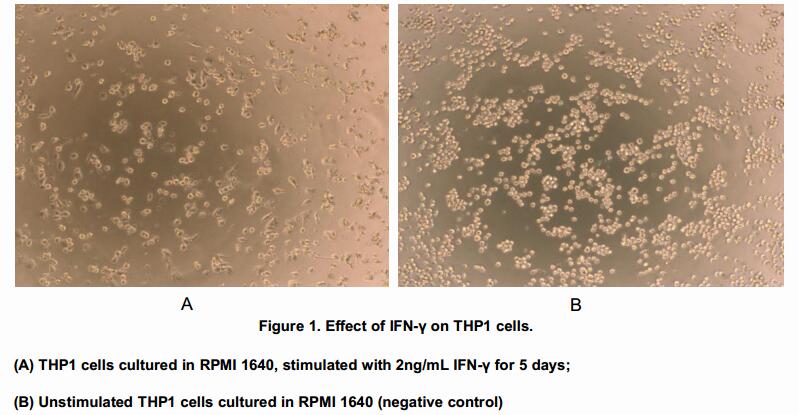Active Interferon Gamma (IFNg)
IFN-G; IFG; IFI; INFr; IFN, Immune Interferon
- Product No.UAPA049Hu01
- Organism SpeciesHomo sapiens (Human) Same name, Different species.
- Buffer Formulation20mM Tris, 150mM NaCl, pH8.0, containing 1mM EDTA, 1mM DTT, 0.01% SKL, 5% Trehalose and Proclin300.
- TraitsFreeze-dried powder
- Purity> 95%
- Isoelectric Point9.6
- ApplicationsCell culture; Activity Assays.
- Download Instruction Manual
- UOM 10µg50µg 200µg 1mg 5mg
-
FOB
US$ 70
For more details, please contact local distributors!US$ 175
For more details, please contact local distributors! US$ 350
For more details, please contact local distributors! US$ 1050
For more details, please contact local distributors! US$ 2625
For more details, please contact local distributors!
ACTIVITY TEST of the Active Interferon Gamma (IFNg)

IFN-γ is a dimerized soluble cytokine that is the only member of the type II class of interferons. The importance of IFNγ in the immune system stems in part from its ability to inhibit viral replication directly, and most importantly from its immunostimulatory and immunomodulatory effects. As reported, IFNγ is an important activator of human monocytic THP1 cells. Therefore, THP-1 cells were incubated in RPMI 1640 with various concentration of IFN-γ, then cells were observed by inverted microscope everyday. After stimulated with IFN-γ (2ng/mL) for 5 days, morphological changes occurred in THP1 cells which displayed the shape of fusiform or polygon and were more likely to adhere. Effect of IFN-γ on THP1 cells is shown in Figure 1.
USAGE of the Active Interferon Gamma (IFNg)
Reconstitute in 20mM Tris, 150mM NaCl (pH8.0) to a concentration of 0.1-1.0 mg/mL. Do not vortex.
STORAGE of the Active Interferon Gamma (IFNg)
Avoid repeated freeze/thaw cycles. Store at 2-8°C for one month. Aliquot and store at -80°C for 12 months.
STABILITY of the Active Interferon Gamma (IFNg)
The thermal stability is described by the loss rate. The loss rate was determined by accelerated thermal degradation test, that is, incubate the protein at 37°C for 48h, and no obvious degradation and precipitation were observed. The loss rate is less than 5% within the expiration date under appropriate storage condition.
INCREMENT SERVICES
BCA Protein Quantification Kit
Molecular Mass Marker for Protein
Monoclonal Antibody Customized Service
Polyclonal Antibody Customized Service
Protein Activity Test Experiment Service
Electrophoretic Mobility Shift Assay (EMSA) Experiment Service
Buffer
Lentivirus Packaging Experiment Service
Adenovirus Packaging Experiment Service
Real Time PCR Experimental Service
Spike RBD Protein (S-RBD)
Protein G
Protein A



